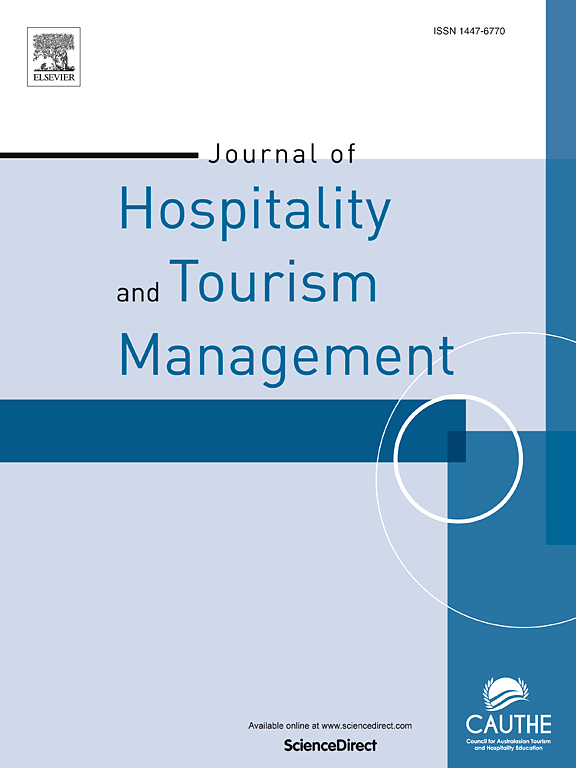Environmental values, face, and ecotourism intention in China:The mediating role of ecotourism attitude and the moderating role of emotional intelligence
IF 7.6
1区 管理学
Q1 HOSPITALITY, LEISURE, SPORT & TOURISM
引用次数: 0
Abstract
Faced with the negative impacts on the environment caused by conventional modes of tourism development, ecotourism has gradually become one of the mainstream components of China's tourism industry. Although ecotourism is gaining popularity in China, the comprehension of the factors that drive ecotourism intention remains limited. Especially the understanding of the relationships between environmental values, face, and ecotourism intention, as well as the role of emotional intelligence in individuals' ecotourism decision-making processes, is still insufficient. This study aimed to contribute to the extant literature by examining the impact of environmental values (i.e., biospheric, altruistic, and egoistic values) and face on ecotourism intention while investigating the moderating effect of emotional intelligence and the mediating effect of ecotourism attitude on these relationships. Based on the value-attitude-behavior model, this study constructed a conceptual model and analyzed the data using structural equation modeling. The original data for this study were collected through combining online and traditional paper-based questionnaire surveys from 560 Chinese tourists. The findings indicate that biospheric and altruistic values, along with face, positively affect ecotourism intention, whereas egoistic values negatively affect it. Biospheric values, altruistic values, egoistic values, and face also indirectly affect ecotourism intention through the mediating role of ecotourism attitude. Furthermore, emotional intelligence positively moderates the influence of biospheric and altruistic values on ecotourism intention. However, emotional intelligence negatively moderates the effect of egoistic values on ecotourism intention. The theoretical contribution of this study lies in its examination of the impacts of environmental values and face on ecotourism intention from a Chinese perspective. This compensates for the lack of attention paid to the impact of these factors, especially face, on ecotourism intention. This study also reveals the mechanism through which environmental values and face influence ecotourism intention by examining the mediating role of ecotourism attitude and the moderating role of emotional intelligence. Furthermore, this study innovates by introducing emotional intelligence as a moderating construct in the context of ecotourism, compensating for the deficiency in existing ecotourism behavior research that pays little attention to emotional intelligence. The findings can also inform ecotourism destination marketing and management organizations and assist ecotourism operators in formulating appropriate marketing and development strategies.
中国的环境价值观、面子与生态旅游意向:生态旅游态度的中介作用和情商的调节作用
面对传统旅游开发模式对环境造成的负面影响,生态旅游逐渐成为中国旅游业的主流组成部分之一。虽然生态旅游在中国越来越受欢迎,但对生态旅游意向驱动因素的理解仍然有限。尤其是对环境价值观、面子和生态旅游意向之间的关系,以及情商在个体生态旅游决策过程中的作用的理解仍然不足。本研究旨在通过考察环境价值观(即生物圈价值观、利他价值观和利己主义价值观)和面子对生态旅游意向的影响,同时研究情商对这些关系的调节作用和生态旅游态度对这些关系的中介作用,为现有文献做出贡献。基于价值-态度-行为模型,本研究构建了一个概念模型,并使用结构方程模型对数据进行了分析。本研究的原始数据是通过对 560 名中国游客进行在线问卷调查和传统纸质问卷调查相结合的方式收集的。研究结果表明,生物圈价值观、利他主义价值观和面子价值观对生态旅游意向有积极影响,而利己主义价值观对生态旅游意向有消极影响。生物圈价值观、利他价值观、利己价值观和面子也通过生态旅游态度的中介作用间接影响生态旅游意向。此外,情商对生物圈价值观和利他主义价值观对生态旅游意向的影响具有正向调节作用。然而,情绪智力对利己主义价值观对生态旅游意向的影响具有负向调节作用。本研究的理论贡献在于,它从中国的视角探讨了环境价值观和面子对生态旅游意向的影响。这弥补了人们对这些因素,尤其是面子因素对生态旅游意向的影响缺乏关注的不足。本研究还通过考察生态旅游态度的中介作用和情商的调节作用,揭示了环境价值观和面子对生态旅游意向的影响机制。此外,本研究创新性地在生态旅游背景下引入了情商这一调节构念,弥补了现有生态旅游行为研究对情商关注较少的不足。研究结果还可以为生态旅游目的地营销和管理机构提供参考,帮助生态旅游经营者制定适当的营销和发展战略。
本文章由计算机程序翻译,如有差异,请以英文原文为准。
求助全文
约1分钟内获得全文
求助全文
来源期刊
CiteScore
13.30
自引率
8.40%
发文量
177
审稿时长
45 days
期刊介绍:
Journal Name: Journal of Hospitality and Tourism Management
Affiliation: Official journal of CAUTHE (Council for Australasian Tourism and Hospitality Education Inc.)
Scope:
Broad range of topics including:
Tourism and travel management
Leisure and recreation studies
Emerging field of event management
Content:
Contains both theoretical and applied research papers
Encourages submission of results of collaborative research between academia and industry.

 求助内容:
求助内容: 应助结果提醒方式:
应助结果提醒方式:


